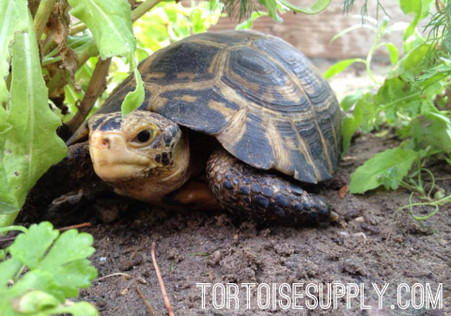- Home
- Tortoises For Sale
- Pet Tortoises For Sale - 4" Size or Larger
- Forstens Tortoise
Forstens Tortoise
Out of Stock
Product Reviews
Description
As of December 6, we have one adult male and a juvenile unsexed forstens available. Make a note during checkout which is your preference.
Common Name: Forstens Tortoise
Scientific Name: Indotestudo Forstenii
Current Size: 4-8" range (make a note for preference of size)
Average Adult Size: 10-12"
Area of Origin: Celebes Islands, Indonesia
Description: Charcoal shell color mottled with lighter patterns very randomly. Most adults have a fair split overall of cream color and the darker black color. Babies can be somewhat variable, with a small percentage having an almost completely cream color (similar to baby elongated tortoises). These tortoises have large solid black eyes, which help them see well in their preferred low light habitats. Adults are often confused with elongated tortoises.
Habitat: These tortoises prefer heavily planted enclosures with heavily shaded areas. They don't handle weather extremes very well, and should ideally be kept between about 60-95 degrees. Moderate to high humidity is preferred by them, and they like shallow water dishes of pools to soak and drink in. They do not truly hibernate, but will go through a winter slow down period during cooler weather and shortened daylengths. As adults, they can safely handle body temperatures as low as 50 degrees at night as long as they are able to heat up into the 70's during the day. Summer highs up to 95 degrees can be tolerated as long as there is a cooler, shaded retreat the tortoise can get into. Moisture is not a problem in warmer temperatures (a cool mud hole on a hot day), but in cooler weather and on cold nights, the tortoises should be kept dry. This species prefers low light conditions, and on summer evenings is often out wandering around just after dark, when most other tortoises have been sleeping for hours. It is again active in the early morning hours whenever temperatures are in a comfortable range for it.
Diet: Little is known about this species natural diet, but do well in captivity on a diet similar to a redfoot tortoise. We offer them a broad range of leafy greens, Mazuri tortoise diet, vegetables and a small amount of fruit. They will eat small amounts of meat sources, although this is probably not needed in captivity if they are getting the needed nutrients from other sources.
Adult Behavior: Wild caught forstens tortoises are somewhat shy and secretive tortoises, but captive raised ones seem to shake this stereotype. They are usually unaggressive towards eachother and can usually be kept long term in mixed-sex groups. They are not diggers, rarely digging holes. They will spend often spend the mid-day hidden, and will be most active in the mornings and evenings during the warm months.
These forstens tortoises were originally wild caught animals imported in September 2013. We dewormed them and got a clean fecal check from our vet, but we still suggest quarantine (caging them by themselves) of these animals for 6+ months prior to adding them to an existing collection.
 Loading... Please wait...
Loading... Please wait...

